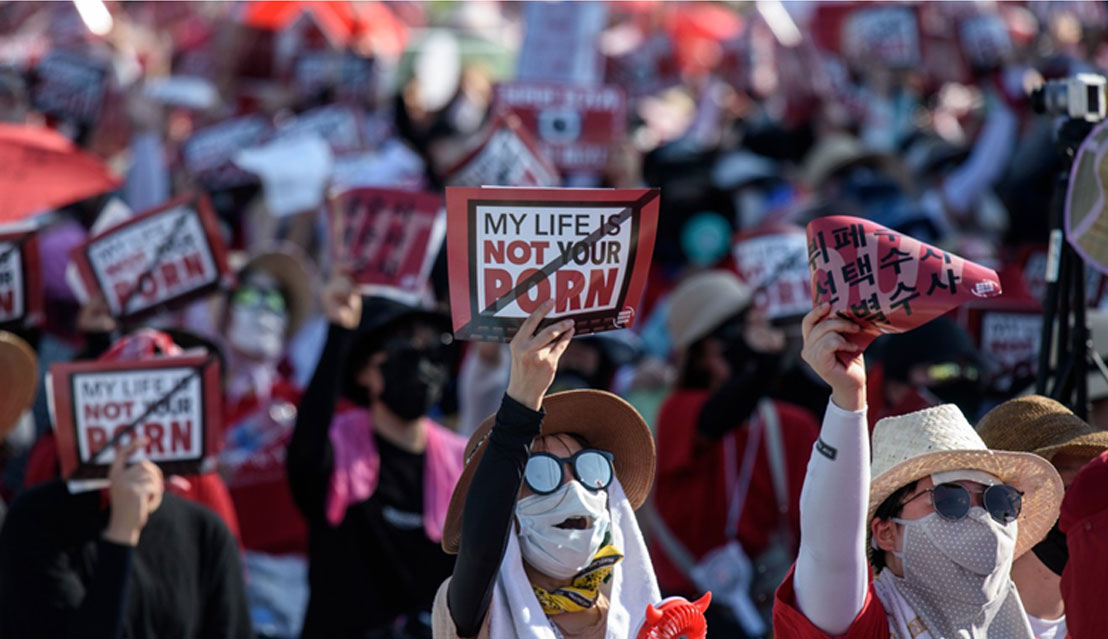In South Korea, the rampant use of spy cameras to record endless videos of women in public places, referred to as ‘Molka’- is a huge national issue that came to light when four men were accused for filming in 1,600 hotel rooms and selling the footage online via porn sites. The use of this high-tech technology does not only give access to constant filming of any activities wherever the spy cams are involved, but they also can be disguised as everyday objects so they arouse no suspicion at all.
In the year 2017, 6000 cases of crimes related to illegal filming were reported to the South Korean police and even though their government has strict measures in place since then, the culture of voyeurism and having these videos available online has not depleted drastically.
The fact that this movement turned into a national epidemic where public washrooms, motel rooms, restrooms and even broadcasting stations were targeted as potential spaces that could be installed with hidden cameras; could have been regulated way before it came to the limelight due to public mobilization against this blatant invasion of privacy. South Korean e-commerce website called GMarket reported a 333% rise in sales of hidden camera devices. Though these devices became popular in their use to record evidence of child abuse or domestic violence, masking them up as everyday items like pens, lighters, watches, computer mice, have also made thousands of women susceptible to invasion of privacy and having their videos on national and international pornographic websites.
What becomes evident then is the repression of toxic masculinity in favor of having a ‘clean image’ for the society, and the way women have been treated in South Korea. While the world was garnering support and women were coming out with their harassment experiences, 10,000 women took to the streets to show their support for the movement and demanded that the spying epidemic and sexual violence against women needs to stop. This was a big step in terms of South Korean feminism moving to a new phase and trying to break out of the deeply patriarchal structure of the society, male groups in the country were blatantly declaring their anger against female mobilization.
South Korean Me Too movement spread so far beyond the professional sector that even college juniors and school students joined the movement and trended #School_MeToo on social media. The tales of sexual harassment and assaults by male teachers or male seniors were reported using this hashtag and one male teacher were reported by his female students for saying girls were “asking to be raped” if they went out drinking at night and wore ‘provocative’ clothes.
Dang Dang We, a group of young men who are “fighting for justice for men”, came into existence when a 39-year old South Korean businessman was charged with harassment for grabbing a woman’s buttocks in a Korean Soup restaurant. What irked this group of misogynists is the fact that the man was charged solely on the basis of the victim’s testimony. Therefore, the group’s logical conclusion was to blame feminism and its empty promises of empowerment and equality.
“Feminism is no longer about gender equality. It is gender discrimination and its manner is violent and hateful,” the leader of the Dang Dang We was quoted saying.
With the wide access and availability of these seemingly normal spy devices, a lot of men were reported to indulge in ‘revenge porn’ and ended up sharing illicit videos of teenage girls or their partners without consent. With the sexual violence perpetrated against women and the normalization of selling private videos online, it becomes apparent that women who speak out are pushed to the boundaries. A widespread introduction of feminist voices and new ideas came into being when a woman was targeted by a man and murdered in the streets of Gangnam in 2016. Because of mass outrage and a demand to make penalties and crime against women a mainstream issue in South Korea, the government implemented squads and stricter penalties against these perpetrators.
Even today, there are regular checks that happen across motels, public washrooms, bath houses and even beauty salons by a special task force dedicated to inspect spy cams. The South Korean companies capitalized on this issue and started creating detectors that can be attached to mobile phones as chips that would detect any electric waves. Women in South Korea have a history of being targets of inequality, fixed gender norms at home, problematic beauty standards, harassment, sexual violence and discrimination at the workplace. Not just relegated to the private life, but popular celebrities and idols have been accused of various counts of drug abuse, attempted rapes, molestation and selling women as favors in the last couple of years. As a result, the outrage and the demands of #MyLifeisNotYourPorn, Girls Don’t Need a Prince and Girls can Do Anything, are not just female voices demanding equal rights and justice against violent tendencies, but also shows an unprecedented change in social norms and perception.







